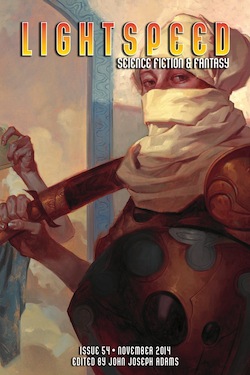Welcome back to the Short Fiction Spotlight, a space for conversation about recent and not-so-recent short stories. Last time around we talked about the inaugural issue of Uncanny Magazine, a newcomer on the short fiction scene that’s being helmed by some familiar faces.
This time, I thought we’d range out a little to a couple of stories from other recent publications: “On the Government of the Living: A Parable” by Matthew Cheney (Interfictions #4, Nov. 2014) and “Instructions” by Roz Kaveney (Lightspeed #54, Nov. 2014; reprinted from Odyssey [1998]). These are two quite different sorts of stories—in fact, it feels a little like doing a reviewer’s grab-bag to put them both together. One is an original publication and one is a reprint; one is, as it says, a sort of parable, while the other is straight-up science fiction. The tonal resonances are also disparate. But: there is something to be said about the diversity of what sorts of stories are being published under the general “speculative fiction” header that these pieces demonstrate.
Plus, I liked them.
Matthew Cheney’s “On the Government of the Living: A Parable” is what I’d call a post-apocalyptic prose poem. It employs a deliberate mix of rich language and vague signifiers to create an indistinct but raw lyrical narrative of a dying future. The individuals are simply “they”; the places also lack names; the memories recalled as part of the nightly sharing rituals are sometimes of people or things with names, but the names do not transmit across time to the speakers.
The refrain that I found particularly intriguing comes in at the end, though—it’s the use of the “if this were a happy story” repetition, which recalls a certain kind of sf intended to challenge positivist tropes. (Think We Who Are About to… by Joanna Russ.) If this were a happy story, there would be some relief from the bleak and slow-rotting reality of the world, but there isn’t. It also gives me a sense of that Beckett-esque dusty, dry, miserable landscape that stands in often for “after the bomb” or “after the agricultural collapse” or “after peak oil” that we tend to see these days. Having just seen Interstellar also, I have some echoes going on with the dying earth there; the difference is, there’s no sudden lift into hope in Cheney’s piece, and in fact, the piece actively refuses that notion of possibility.
As such, it’s also a rumination on mortality, though a particularly unwelcoming one that says simply: yes, that’s how it is—we’re going to die. Children, adults; nothing—there’s nothing going forward. And in a genre that leans toward the big idea, the grand climax, the hope for the future, there’s something a little notable and sharp about a narrative that refuses those tendencies and goes instead for the slow, inevitable breakdown of all things, including language.
So, it’s obviously not a cheerful piece, “On the Government of the Living: A Parable.” But it is doing something interesting, and I think the title also offers an angle on what it has to say about the nature of human life. (Though it isn’t anything nice.)
Conversely, “Instructions” by Roz Kaveney is a science fiction story with a dose of philosophical scaffolding. It traces two narrative paths that intermingle and explore a set of propositions for being (the Instructions). The first strand of the story follows a pair of humans, Helena and Philip, who have been friends since childhood and eventually end up on a far-flung space mission together. The second is of an alien civilization who set up the beacon that calls other races to space in the first place, but then evolves in a different philosophical direction all together. In the end, the whole lot of them build up a sort of neighborhood of galactic exchange while Philip and Helena decide to just “have fun” in the end (which becomes the third Instruction).
This is a clever and charming piece that feels sufficiently tongue-in-cheek to make me smile. It’s also exploring a pleasant frame of ideas about being: uselessness, kindness, and fun—a set of potentialities that seems to offer a good experience to the people living them. Helena and Philip’s lifelong relationship and dry, casual banter has a dimension that I don’t often see with couples in science fiction stories, either. It’s understated and constant and functional. The pair of them just do well together, and get things done, despite their flaws and disagreements.
The alien narrative is also well-constructed. It’s told as a sort of history to the listener—as is the story of Helena and Philip—to explain how the Instructions came to be and what they have to offer. The trajectory of alien evolution is rendered in a believable and sufficiently, well, alien manner as well. There’s something about the idea of genetic philosophy that seems neat; the idea, however, doesn’t overtake the whole story, which remains balanced on the feelings and lives of individuals, and the quiet and cosmic reality of other life in the universe.
It was a pleasant read, occasionally comedic and delightfully wry. Kaveney’s style of narration keeps the reader engaged without pulling them too far in or displacing them too far out of the action. It gives the whole experience a light touch that I appreciated, particularly after the Cheney piece. So, in a way, perhaps the pairing here does make a little sense—but that’s still probably stretching it. Either way: good stories, these.
Lee Mandelo is a writer, critic, and editor whose primary fields of interest are speculative fiction and queer literature, especially when the two coincide. She can be found on Twitter or her website.










